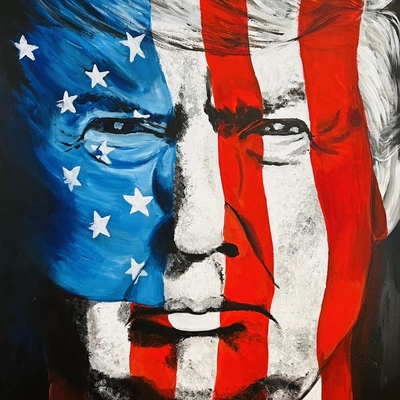Stay informed on the latest Truth Social posts from Donald Trump (@realDonaldTrump) without the doomscrolling. Consider it a public service for your mental health. (Why?)
- The Asia trip was incredibly successful
- More business was brought into the United States than by any prior President
- The image presents Donald Trump participating in an official diplomatic or state visit.
- It depicts a formal presidential arrival with accompanying ceremonial honors.
- The visual narrative conveys a sense of international engagement and adherence to protocol.
- The Kennedy Center's columns are being painted white, replacing previously existing gold paint.
- Many major improvements are being made to the Kennedy Center, including seating, carpeting, wall coverings, ceilings, chandeliers, stages, heating, and A/C.
- The Kennedy Center will soon be the finest Arts and Entertainment Center in the World.
- The Kennedy Center remains fully open during its construction, renovation, and beautification.
- Donald Trump is performing a similar, albeit larger scale, improvement to the United States of America.
- China has taken an extraordinarily aggressive position on Trade.
- China sent an extremely hostile letter to the World.
- China stated they would impose large-scale Export Controls on virtually every product they make, effective November 1st, 2025.
- These Chinese export controls affect ALL Countries, without exception.
- China's plan was devised years ago and is unheard of in International Trade.
- China's action is a moral disgrace in dealing with other Nations.
- The United States of America will impose a Tariff of 100% on China, over and above any current tariffs, starting November 1st, 2025 (or sooner).
- The United States will impose Export Controls on any and all critical software, also starting November 1st, 2025.
- It is impossible to believe that China would have taken such an action, but they have.
- Israel and Hamas have both signed off on the first Phase of a Peace Plan.
- All Hostages will be released very soon.
- Israel will withdraw their Troops to an agreed upon line.
- These actions are the first steps toward a Strong, Durable, and Everlasting Peace.
- All Parties will be treated fairly.
- This is a GREAT Day for the Arab and Muslim World, Israel, all surrounding Nations, and the United States of America.
- Mediators from Qatar, Egypt, and Turkey worked with the United States to make this Historic and Unprecedented Event happen.
- Donald J. Trump is the President of the United States of America.
- Hamas has been a ruthless and violent threat for many years, culminating in the October 7th massacre.
- Over 25,000 Hamas "soldiers" have been killed as retribution for the October 7th attack.
- Most of the remaining Hamas fighters are militarily trapped.
- Donald Trump can give the word to quickly extinguish the lives of trapped Hamas fighters.
- Remaining Hamas members are known, will be hunted down, and killed.
- Innocent Palestinians are asked to immediately leave areas of potentially great future death for safer parts of Gaza.
- A peace deal has been agreed upon by Middle Eastern nations, the U.S., and Israel, bringing peace after 3000 years.
- This peace deal spares the lives of all remaining Hamas fighters.
- The details of the peace document are known to the world and are beneficial for all.
- Hamas is given one last chance to accept the agreement.
- An agreement must be reached with Hamas by Sunday Evening at 6 P.M., Washington, D.C. time.
- Every Country has signed on to this agreement.
- If the last chance agreement is not reached, "all HELL, like no one has ever seen before," will break out against Hamas.
- Peace in the Middle East will be achieved "one way or the other."
- All hostages, including the bodies of the dead, must be released immediately.
- The movie-making business has been stolen from the United States by other countries.
- California, with its 'weak and incompetent Governor,' has been particularly hard hit by this situation.
- A 100% tariff on any and all movies made outside of the United States will solve this long-standing problem.
- A horrendous shooting occurred at the Church of Jesus Christ of Latter-day Saints in Grand Blanc, Michigan.
- The FBI is leading the federal investigation and providing full support to State and Local Officials.
- The suspect in the shooting is dead.
- The incident appears to be a targeted attack on Christians in the United States of America.
- The Trump Administration will keep the public posted on developments.
- There is an epidemic of violence in the country that must end immediately.
- Prayers are requested for the victims and their families.
- Ukraine, with EU and NATO support, is positioned to fight and win back all its original territory.
- Russia has been fighting aimlessly for three and a half years in a war that a 'Real Military Power' could have won in less than a week.
- Russia is made to look like 'a paper tiger.'
- Russia is experiencing significant economic trouble, including difficulties in obtaining gasoline, with most of its money spent on the war.
- Ukraine possesses 'Great Spirit' and is improving.
- Ukraine might be able to 'go further' than just taking back its original country.
- Putin and Russia are in 'BIG Economic trouble,' presenting an opportune time for Ukraine to act.
- The United States will continue to supply weapons to NATO for their discretion.
- The United States of America built Bagram Airbase.
- Afghanistan currently possesses Bagram Airbase.
- Afghanistan must return Bagram Airbase to the United States.
- Failure by Afghanistan to return Bagram Airbase will result in severe negative consequences.

